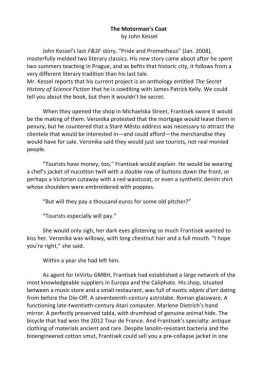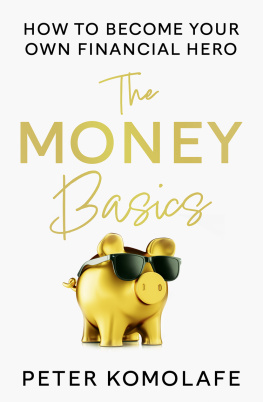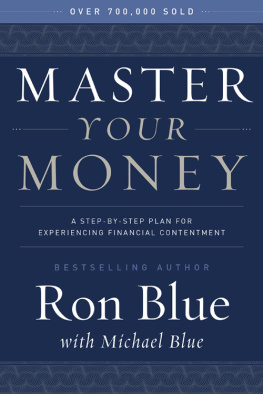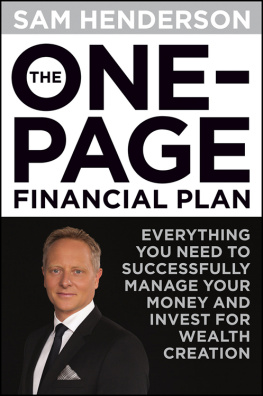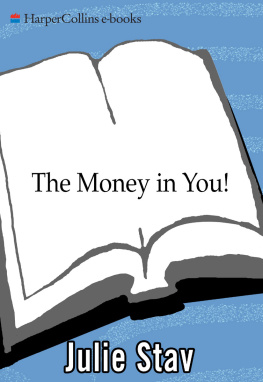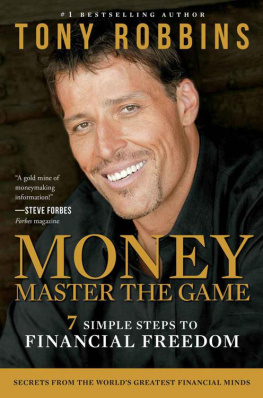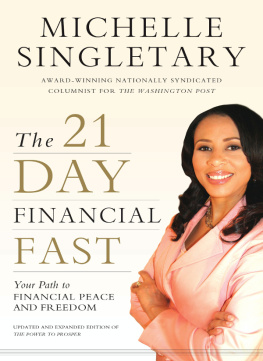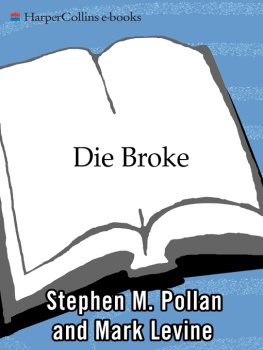Kessel - Its not about the money: a financial game plan for staying safe, sane, and calm in any economy
Here you can read online Kessel - Its not about the money: a financial game plan for staying safe, sane, and calm in any economy full text of the book (entire story) in english for free. Download pdf and epub, get meaning, cover and reviews about this ebook. City: New York, year: 2008, publisher: HarperCollins;HarperOne, genre: Romance novel. Description of the work, (preface) as well as reviews are available. Best literature library LitArk.com created for fans of good reading and offers a wide selection of genres:
Romance novel
Science fiction
Adventure
Detective
Science
History
Home and family
Prose
Art
Politics
Computer
Non-fiction
Religion
Business
Children
Humor
Choose a favorite category and find really read worthwhile books. Enjoy immersion in the world of imagination, feel the emotions of the characters or learn something new for yourself, make an fascinating discovery.

- Book:Its not about the money: a financial game plan for staying safe, sane, and calm in any economy
- Author:
- Publisher:HarperCollins;HarperOne
- Genre:
- Year:2008
- City:New York
- Rating:3 / 5
- Favourites:Add to favourites
- Your mark:
- 60
- 1
- 2
- 3
- 4
- 5
Its not about the money: a financial game plan for staying safe, sane, and calm in any economy: summary, description and annotation
We offer to read an annotation, description, summary or preface (depends on what the author of the book "Its not about the money: a financial game plan for staying safe, sane, and calm in any economy" wrote himself). If you haven't found the necessary information about the book — write in the comments, we will try to find it.
Kessel: author's other books
Who wrote Its not about the money: a financial game plan for staying safe, sane, and calm in any economy? Find out the surname, the name of the author of the book and a list of all author's works by series.
Its not about the money: a financial game plan for staying safe, sane, and calm in any economy — read online for free the complete book (whole text) full work
Below is the text of the book, divided by pages. System saving the place of the last page read, allows you to conveniently read the book "Its not about the money: a financial game plan for staying safe, sane, and calm in any economy" online for free, without having to search again every time where you left off. Put a bookmark, and you can go to the page where you finished reading at any time.
Font size:
Interval:
Bookmark:
Unlock Your Money Type to Achieve Spiritual and Financial Abundance

Wealth is not his that has it, but his that enjoys it.
B ENJAMIN F RANKLIN
Regardless of your net worth, if you are like most people in our society, you would probably like to change something about your relationship to money. Maybe you have a healthy nest egg built up, yet you still worry about having enough for the future. Maybe youre struggling with the basics of sound financial management, with bank balances and assets that arent anywhere near what they should be, given the amount youve earned over time. Or maybe you become paralyzed with indecision anytime you need to make a major financial decision.
You are not alone. When it comes to money, most of us have experienced one or more of the following:
- Feelings of anxiety and fear
- A sense that money is separate from the more sacred or spiritual parts of our lives
- Endless wants, or the feeling that well never have enough money to be happy
- Frustration with a spouse or family member regarding spending habits
- The belief that our finances are beyond our control
In my twelve years of running one of the nations top financial planning and money management companies, Ive worked with people who have hundreds of millions of dollars, as well as people who are a hundred thousand in debt. Ive counseled captains of industry who are driven to ever higher levels of financial success and social activists one paycheck away from eviction. Ive led workshops for seasoned students of meditation and yoga and for affluent entrepreneurs enjoying the good life. While theres no denying that in many ways it is easier to be rich than poor, I have found that without exception it makes little difference what peoples outer life circumstances areeveryone struggles with some aspect of their relationship to money.
Ive seen it all, from the middle-aged owner of a successful software company who frets over buying a new couch, to the single mother anguished by her $25,000 in credit-card debt but unwilling to say no to her sixteen-year-old sons plea for a new car, to the young fashion designer who is so ashamed of her substantial inheritance that she lives in an unsafe neighborhood so that she can afford the rent on her salary alone. The darkest emotions evoked by money often have absolutely nothing to do with objective security. I know people who live on $20,000 per year with no fear and others who live on millions with unrelenting anxiety. Ive also encountered many people who consider themselves self-aware and conscious, perhaps having gone through great personal transformations with the help of psychotherapy, twelve-step programs, or religious or spiritual practice, but who have extremely unconscious and unsatisfying relationships to money. Millions who came of age in the 1960s and 70s, for example, though outwardly successful, have great distrust in, if not utter disdain for, Wall Street and corporate America, and are often trapped in unhealthy, self-sabotaging money behaviors. Finally, for so many of us, no matter which generation we come from or what we believe about money, rich or poor, there can never be enough. We crave more money, material possessions, or investment success, even when our financial needs dont warrant it. We might know that were caught up in our desire but feel impotent to do anything about it.
Many people find themselves stuck in a pattern with money regardless of whose advice they follow or how much time goes by. To make matters even more challenging, they may end up with a partner or family member whose values, fears, or financial tendencies irritate them. Old habits die hard. The person who has always felt poor goes on feeling poor and making decisions from a poverty mindset; the penny-pincher remains frugal, perhaps to the point of deprivation.
The predominant message in our culture is that its all about the moneythat more money or a different set of financial circumstances will bring us the freedom to stop worrying and just enjoy life. But many people remain stuck in the same financial predicament, even though theyve tried everything they know to get ahead. No matter what your balance sheet looks like, you probably already suspect that there has to be a way to make the lasting, profound changes in your financial life that you crave, or you wouldnt have picked up this book.
One reason most people arent happy with their financial lives is that the ways we have traditionally been taught to deal with money simply dont work. We are told to spend less, to save more, to think positive thoughts that will create the abundance we want, or to find the perfect career. We set goals, create budgets, put all the right insurance in place, write updated wills and estate plans, and invest in a certain way. Though important, these actions arent enough. The reason? They approach money from the outside in, rather than from the inside out.
Whether we hoard, splurge, or give it all away, we perpetually repeat ineffective behavior patterns with money because we are accustomed to specific states of being where money is concerned. We are used to a particular level of anxiety or calm, craving or avoidance, scarcity or abundance. And no matter what changes occur in our outer circumstances, the unconscious mind, if it remains unexamined, untrained, and unconnected to our spirit, will recreate those old, familiar circumstances in our financial life.
This is the reason Ive seen people sell a business for many millions of dollars and then, through bad decision-making, either spend, loan, or poorly invest their nest egg, ending up in exactly the same financial condition they were in prior to their windfall. Their unconscious mind was so used to striving to make it that they literally couldnt cope with the abundance and freedom that was thrust upon them, so their unconscious manifested the old, familiar financial conditions in their outer lives again. Americans as a whole enjoy a higher standard of living than most of the world, at least in financial terms. Yet even when people achieve the financial success thats so highly valued by our culture, they arent necessarily content. Weve all heard about people who receive a huge windfall but are still unhappy or anxious all the time. The business press is filled with stories of workaholics who have built one business after another, at times even alienating their loved ones or destroying their marriages. There are wealthy inheritors and divorces who are among the most tormented souls I know.
Dont get me wrong. I am by no means saying that you cant be both wealthy and happy. But whether you have a seven-figure trust fund or a pile of unpaid bills on your kitchen table, the path to freedom requires that you focus more on your inner life than on your outer financial circumstances.
Those of you facing a stack of bills with no means to pay them may balk at the notion that you can change your outer circumstances by going within, but the fact is that I have seen it happen in countless peoples lives. And though its easy to tell you to go within for answers, this book will show you how to do just that. Ive successfully used the tried-and-true strategies youll find in these pages for myself and for hundreds of clients and workshop participants. The insights youll find here grow out of my own experience of having a foot in two distinct worlds.
From a very young age, Ive been fascinated with making money, yet I also always knew that there was more to life. I studied economics and psychology in college and began my professional career in the commercial mortgage business. But I wanted to provide much more holistic financial advice to people than the mortgage business would allow. In 1996 I founded Abacus Wealth Management, which I later merged with my partner, Spencer Sherman, to create Abacus Wealth Partners, a fee-only financial planning business that focuses on the internal and external factors essential to creating a satisfying financial life, primarily serving very affluent clients. Later, as Abacus grew, we saw how poorly served most investors were, regardless of their net worth. In an effort to reach a larger, less affluent population, we established Kubera Portfolios for clients who wanted a low-cost but professionally managed way to invest. By this time, I had begun a daily two-hour practice of the ancient Ashtanga system of yoga postures and, for many years before this, had immersed myself in Eastern spiritual practices. As a Certified Financial Planner professional by day and a yogi by dawn, I went from yoga studio to office, from client meeting to meditation cushion, and from financial conference to weekend retreat. I began to notice a profound difference between how financial planning approached our everyday challenges and complaints and how the worlds oldest wisdom traditions approached them. In the financial planning world, when a problem arises in a clients life, there is always a better financial strategy that will solve the problem and bring greater fulfillment and happiness. The solutions exist primarily in the outer, tangible world. There is an implicit assumption that something must change out there in order to be happier in here.
Font size:
Interval:
Bookmark:
Similar books «Its not about the money: a financial game plan for staying safe, sane, and calm in any economy»
Look at similar books to Its not about the money: a financial game plan for staying safe, sane, and calm in any economy. We have selected literature similar in name and meaning in the hope of providing readers with more options to find new, interesting, not yet read works.
Discussion, reviews of the book Its not about the money: a financial game plan for staying safe, sane, and calm in any economy and just readers' own opinions. Leave your comments, write what you think about the work, its meaning or the main characters. Specify what exactly you liked and what you didn't like, and why you think so.


